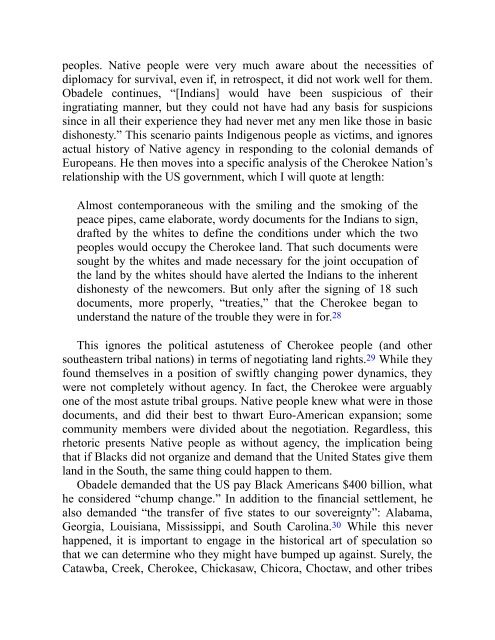Create successful ePaper yourself
Turn your PDF publications into a flip-book with our unique Google optimized e-Paper software.
peoples. Native people were very much aware about <strong>the</strong> necessities <strong>of</strong><br />
diplomacy for survival, even if, in retrospect, it did not work well for <strong>the</strong>m.<br />
Obadele continues, “[Indians] would have been suspicious <strong>of</strong> <strong>the</strong>ir<br />
ingratiating manner, but <strong>the</strong>y could not have had any basis for suspicions<br />
since in all <strong>the</strong>ir experience <strong>the</strong>y had never met any men like those in basic<br />
dishonesty.” This scenario paints <strong>Indigenous</strong> people as victims, and ignores<br />
actual history <strong>of</strong> Native agency in responding to <strong>the</strong> colonial demands <strong>of</strong><br />
Europeans. He <strong>the</strong>n moves into a specific analysis <strong>of</strong> <strong>the</strong> Cherokee Nation’s<br />
relationship with <strong>the</strong> US government, which I will quote at length:<br />
Almost contemporaneous with <strong>the</strong> smiling and <strong>the</strong> smoking <strong>of</strong> <strong>the</strong><br />
peace pipes, came elaborate, wordy documents for <strong>the</strong> Indians to sign,<br />
drafted by <strong>the</strong> whites to define <strong>the</strong> conditions under which <strong>the</strong> two<br />
peoples would occupy <strong>the</strong> Cherokee land. That such documents were<br />
sought by <strong>the</strong> whites and made necessary for <strong>the</strong> joint occupation <strong>of</strong><br />
<strong>the</strong> land by <strong>the</strong> whites should have alerted <strong>the</strong> Indians to <strong>the</strong> inherent<br />
dishonesty <strong>of</strong> <strong>the</strong> newcomers. But only after <strong>the</strong> signing <strong>of</strong> 18 such<br />
documents, more properly, “treaties,” that <strong>the</strong> Cherokee began to<br />
understand <strong>the</strong> nature <strong>of</strong> <strong>the</strong> trouble <strong>the</strong>y were in for. 28<br />
This ignores <strong>the</strong> political astuteness <strong>of</strong> Cherokee people (and o<strong>the</strong>r<br />
sou<strong>the</strong>astern tribal nations) in terms <strong>of</strong> negotiating land rights. 29 While <strong>the</strong>y<br />
found <strong>the</strong>mselves in a position <strong>of</strong> swiftly changing power dynamics, <strong>the</strong>y<br />
were not completely without agency. In fact, <strong>the</strong> Cherokee were arguably<br />
one <strong>of</strong> <strong>the</strong> most astute tribal groups. Native people knew what were in those<br />
documents, and did <strong>the</strong>ir best to thwart Euro-American expansion; some<br />
community members were divided about <strong>the</strong> negotiation. Regardless, this<br />
rhetoric presents Native people as without agency, <strong>the</strong> implication being<br />
that if Blacks did not organize and demand that <strong>the</strong> <strong>United</strong> <strong>States</strong> give <strong>the</strong>m<br />
land in <strong>the</strong> South, <strong>the</strong> same thing could happen to <strong>the</strong>m.<br />
Obadele demanded that <strong>the</strong> US pay Black Americans $400 billion, what<br />
he considered “chump change.” In addition to <strong>the</strong> financial settlement, he<br />
also demanded “<strong>the</strong> transfer <strong>of</strong> five states to our sovereignty”: Alabama,<br />
Georgia, Louisiana, Mississippi, and South Carolina. 30 While this never<br />
happened, it is important to engage in <strong>the</strong> historical art <strong>of</strong> speculation so<br />
that we can determine who <strong>the</strong>y might have bumped up against. Surely, <strong>the</strong><br />
Catawba, Creek, Cherokee, Chickasaw, Chicora, Choctaw, and o<strong>the</strong>r tribes


















